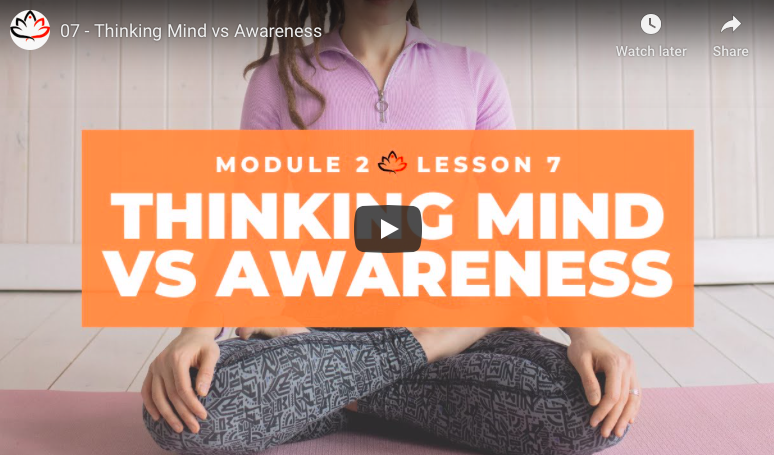Today, I want to elaborate on a concept which empowers us to meditate at a much deeper level, and can be especially valuable for beginner meditators. This is something which is covered in the SkillfulMIND program, but I want to share this valuable lesson with the wider community.
This concept is that of our ‘Thinking Mind’ and our ‘Awareness’ – and the difference between the two.
The ability to differentiate between them is incredibly important, as in meditation we need to get ourselves out of our thinking mind, and stay within awareness as much as we can. Knowing whether you are thinking, or simply being aware, is crucial. The two can seem so similar, and are so closely related, that people often mistake them for both simply being ‘the mind’, as one.
So, in this blog I want to explain the differences between the two and help you understand the contrast between awareness and the thinking mind. To do this, let me start by asking some questions which you can incorporate into your meditation practice to see if you are in awareness. We must also keep in mind that awareness can be divided into body awareness and mind awareness.
Let us begin with the body, ask yourself:
– What position are your feet in?
– What position are your legs in?
– Can you feel yourself sitting against the chair? – if so, what is the texture pressure of the chair against your body?
– Do you feel any aches or pains in the body?
– Can you feel the air against your skin?
– Are you aware of any smells in the room at the moment?
And now, to understand mind awareness, ask yourself:
– Do you feel any urges such as hunger?
– Do you have an urge to itch?
– Do you feel any emotions in the body or mind at the moment?
– What exactly is the current thought that you are having now?
Can you see how all of these questions elicit the part of our mind that is awareness?
In contrast, let me ask some questions which we can relate to our thinking mind (keeping in mind that the ‘thinking mind’ is in either the past, future or abstract, but never in the present moment):
– How do you feel about whether you’re wanting to move?
– What do you think you should do about it?
– What do you think about this concept we are talking about right now?
Can you see how all of these questions relate to our thinking mind?
To sum all of this up, we can see that the thinking mind is in a seperate part of the brain to our awareness mind. And to deepen our meditation we must go into the latter, which means, to be in the present moment. Once we realise and understand that, our practice will become so much more profound.
I hope that this helps you with your practice, and if you manage even 4-5 minutes without veering into the thinking mind, you will immediately notice the difference in your state. Continue practicing and learning.
